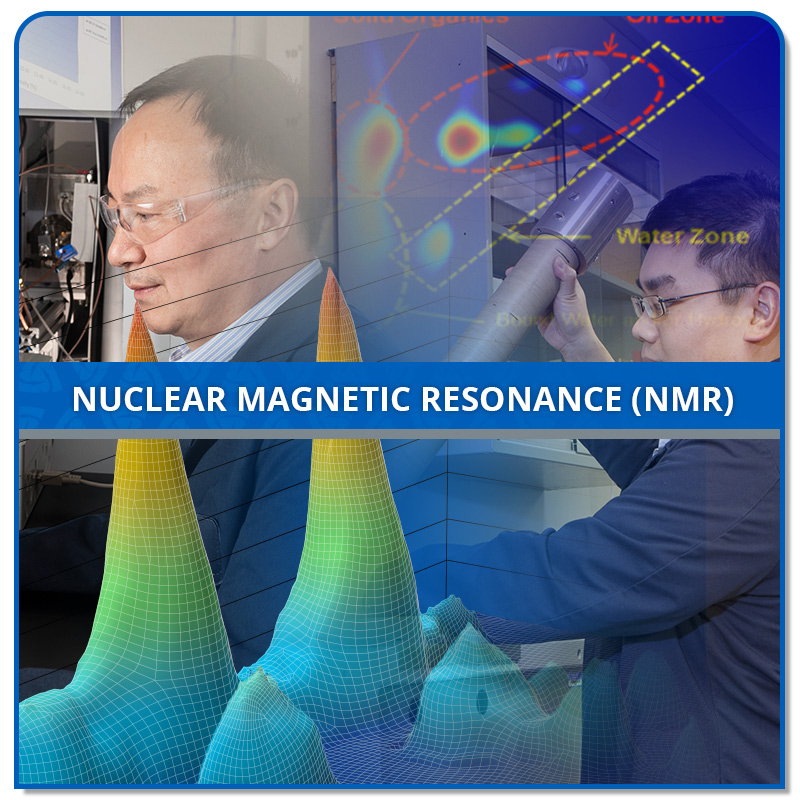Core Characterization
Core analysis is fundamental to evaluate reservoir potential, design effective production strategies, and determine commercial viability. Measured core data is essential for calibrating wireline logs and refining static and dynamic reservoir simulation models.
Core Characterization Services & Products
Proper handling and wellsite sampling methods are essential for maintaining core integrity and for understanding drilling fluid invasion in the core.

Core Stabilization and Wellsite Logistics
Stabilizing and properly transporting core material from the wellsite is essential for maintaining quality for reservoir characterization studies.
Mud Tracing Services
Utilize tracers to accurately determine and correct for drilling mud invasion on core saturations and formation fluid samples.

Digital Rock Characterization services combine state-of-the-art technologies and data from our Joint Industry Projects to provide digital representations of rocks and real-time insights into reservoir properties and performance.

AI Petrophysical Analog Tool
ART™ uses artificial intelligence to analyze thin section images and search our global rock catalog for measured analog data. This tool provides early-time petrophysical data and can be utilized when rock samples are not suitable for physical lab measurements.
Non-Invasive Technologies
NITRO℠ (Non-Invasive Technologies for Reservoir Optimization) provides quick high-resolution reservoir property data before full core processing.


Dual Energy CT
Early-time 3D visualization with preliminary lithological description, high resolution bulk density, photoelectric factor, porosity, unconfined compressive strength, and dynamic sonic values.
Micro CT Sample Screening
MicroScan℠ highlights micro-fractures in plug samples which can negatively impact advanced testing such as flow studies or geomechanics.

Geoscience services serve to understand fundamental and essential aspects of reservoir origin, evolution, and characteristics. Sedimentology, petrology, geochemistry, and mineralogy provide valuable insights into factors controlling deposition, structure, maturity, composition, and potential formation damage.

Sedimentology
Characterization and identification of crucial depositional and lithological features to help define geologic history, determine controls on reservoir quality, and assess lateral landing targets and potential mechanical barriers.
Petrology and Mineralogy
Determine mineral and clay compositions, texture, microstructures, and burial history to understand the formation and distribution of reservoirs and confining layers.


Chemostratigraphy
Comprehensive and high-resolution elemental analysis of rock material for reservoir correlation, lateral landing assessment, and understanding reservoir heterogeneity.
Rock Geochemistry
Develop a holistic understanding of your whole rock and fluids system using industry-leading workflows for organic and inorganic chemistry techniques led by our expert team.


Fluid and Gas Geochemistry
Geochemical characterization of hydrocarbon fluids provides valuable information during exploration, development, and production stages.
Wireline logs provide valuable information about reservoir rocks and fluids, but require laboratory-based calibration data for accurate interpretation. Analytical programs should be designed based on lithology, fluid systems and objectives to fully understand reservoir properties and performance.

Rock Properties
Fundamental measurements of rock quality and saturations for wireline log calibration and understanding reservoir potential.
Capillary Pressure
Determine the fluid distribution and movement within the reservoir.


Electrical Properties
Provides formation-specific parameters for validation of log-based water saturation models.
Nuclear Magnetic Resonance (NMR)
Provides sample specific cutoffs for bound versus producible fluids as well as porosity, permeability, fluid type, and saturation information.

Understanding multi-phase flow behavior and identification of formation damage mechanisms is crucial for predicting and managing future reservoir performance.

Relative Permeability
Applications include prediction of multi-phase fluid flow behavior through reservoir rock and understanding rock-fluid interactions such as wettability and trapping.
Formation Damage
Reservoir condition analyses integrated with geological data to identify and mitigate damage mechanisms and optimize well performance and injectivity.


Enhanced Oil Recovery
Understanding the chemical and physical behavior during secondary and tertiary recovery processes is critical for maximizing hydrocarbon recovery and minimizing residual oil saturation.
Understanding the mechanical behavior of rock can be used to mitigate risks associated with wellbore stability while drilling, stimulation of the reservoir, and sand control during production.

Geomechanics
The theoretical and applied science of the mechanical behavior of rock which can be used to mitigate risks associated with wellbore stability while drilling, stimulation of the reservoir, and sand control during production.
